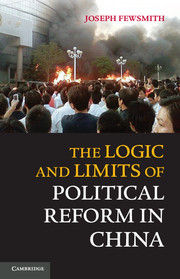Introduction
Published online by Cambridge University Press: 05 January 2013
Summary
The story of China's rise over the last three decades is largely a political story, one that seemed highly unlikely when it started. A century of political decline, internecine conflict, and revolution hardly seemed like a propitious foundation for economic development. But the death of Mao Zedong in 1976 and the rise of Deng Xiaoping at the Third Plenary Session of the Eleventh Central Committee in 1978 gave the Chinese Communist Party (CCP) a new lease on life. Its leaders were well aware that its legitimacy was weak. People talked of the “three crises” – spiritual (jingshen weiji), belief (xinyang weiji), and culture (wenhua weiji). Not only was the charismatic leader dead, but the leader who tried to routinize charisma, Hua Guofeng, was repudiated by the Dengist coalition. Raising the banner of “practice,” Deng Xiaoping turned to performance legitimacy to restore the CCP's reputation.
In 1978, promises of economic development were difficult to believe. Per capita urban income was 316 yuan, and in the rural areas one-quarter of the population lived on incomes of less than 50 yuan per year. The situation was so bad that the party's senior economic specialist, Chen Yun, warned that if something were not done, peasants in the countryside would flock into the cities to demand food. Desperation and weak legitimacy led the CCP to embark on a course of economic reform, starting with the household responsibility system (HRS) in the countryside.
- Type
- Chapter
- Information
- The Logic and Limits of Political Reform in China , pp. 1 - 17Publisher: Cambridge University PressPrint publication year: 2013



